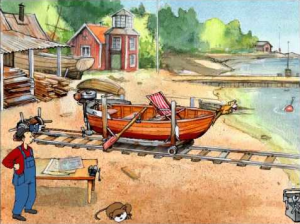Welcome to Newsletter 22!
Sorry we’ve been quiet for a few weeks now. Busy times for us in the office and stressful time right now (election season/pandemic) makes it difficult to publish these regularly. To lighten the mood a bit, here’s not just one, but two funletters:
>>>Mechanical Engineering<<< and >>>Aerospace Engineering<<<
To learn more about space exploration see our prior newsletter on the topic (I also wanted to link a Mechanical Engineering newsletter we’ve written but just noticed we don’t have one – look out for one in the close future!). Edit: Arghh, forgot to set this as public!! Well, it’s live now on Monday, not Friday, sorry!
Resource Highlight
 One of the first games I ever played was “Welly Werkel – Schiffe Bauen”, a German game in which you built ships and explored the world. Although I certainly wasn’t thinking about being a mechanical engineer at my young age then, I really enjoyed the concept of making things – ships in this case – then Legos, and eventually robots in my high school robotics team, which all culminated into my undergrad as a mechanical engineer. Games are more than just fun – they can broaden your horizon by showing you things that you might enjoy and teaching you STEM concepts at the same time. Sadly, this game is ancient and I can’t find copies of it to replay, but there are plenty of modern games focused on mechanical engineering themes and concepts:
One of the first games I ever played was “Welly Werkel – Schiffe Bauen”, a German game in which you built ships and explored the world. Although I certainly wasn’t thinking about being a mechanical engineer at my young age then, I really enjoyed the concept of making things – ships in this case – then Legos, and eventually robots in my high school robotics team, which all culminated into my undergrad as a mechanical engineer. Games are more than just fun – they can broaden your horizon by showing you things that you might enjoy and teaching you STEM concepts at the same time. Sadly, this game is ancient and I can’t find copies of it to replay, but there are plenty of modern games focused on mechanical engineering themes and concepts:
- Engineering.com has a huge collection of free engineering games, of which this LinkageDraw game is definitely focused on Mechanical Engineering. Using linkages in mechanical designs is pretty important, but it can be difficult to visualize what your linkage does ahead of time; this game really visualizes how linkages move.
- Crazy Machine 3 and Contraption Maker are both [not free :(] games in which you build crazy contraptions and machines, either to solve puzzles, or to see what wild and wacky things you can come up with.
- Rollercoaster Engineers are parts mechanical engineers and parts electrical engineers – designing fun rides that are structurally safe and mechanically fun to ride. There’s a variety of games that deal with rollercoaster design and theme park management, from the classic Rollercoaster Tycoon series (I have very fond memories of RCT2), to the more modern (2D) Parkitect, to the (3D) Planet Coaster.
- Monument Valley 2 may at first glance not seem like a mechanical engineering-related game, but ultimately it’s a game about perspective and is drawn in an isometric view – things mechanical engineers need to be familiar with, as orthographic drawing views are critical when designing and making parts.
- Besiege is a game focused on making medieval siege engines and is a bit on the violent side (so not recommended for younger students) – but it teaches about connecting mechanical parts to build a machine – quite fun and creative.
- Additionally, a list of space-related games can be seen on the space exploration blog post I linked above (although adding a shout out to the game Space Engineers).
Web Resources for K-12 Students and Parents
In addition to the resource highlight above, which is tied directly to the Newsletter topic, we will also highlight two new web resources each week.
- iRobot Education

IRobot Education offers a look at all iRobot programs, including job shadows, and introduction to robots, a coding platform that features a simulator, as well as content on the Learning Library. - Book Proofs by Laurent Lessard
A blog by new (Aug 2020) Northeastern MIE professor Laurent Lessard, featuring mathematical riddles, puzzles, and elegant proofs (which typically require a high level of math). Very interesting, especially some of the results, even if the math is sometimes way over my head; for example: the probability of winning a card game of War flawlessly is 3.13×10^-9, meaning you’d need to play ~1 billion games to for a 95% to do win so once.

